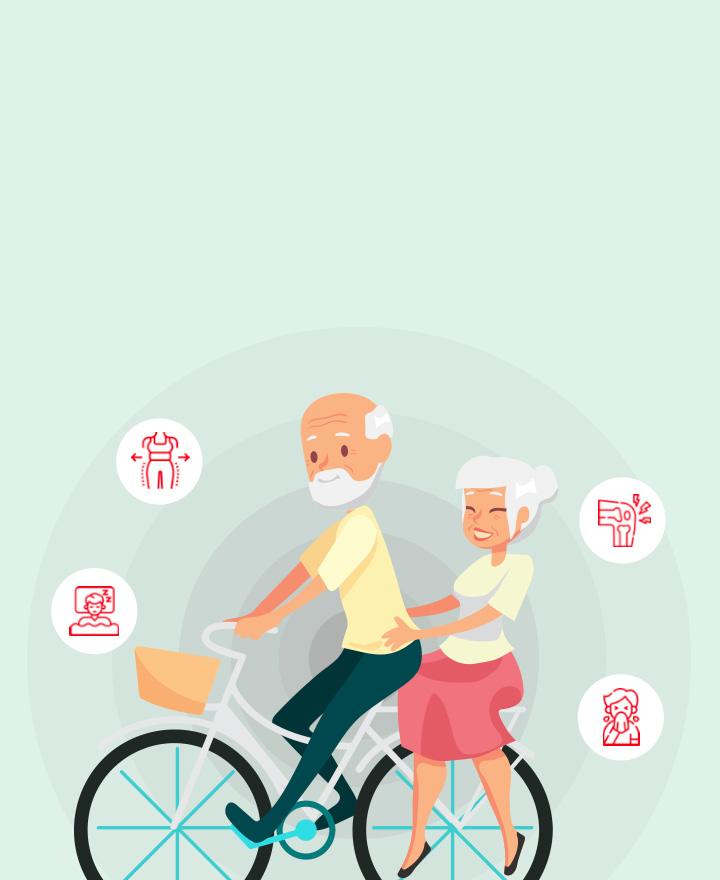

Unexpected Health Challenges that Come with Ageing
While it is a good thing that medical science is letting you look forward to a long life, you need to make sure it is a healthy one as well. In other words, if you are 60 or above, you need to be aware of the changes that Ageing brings about in your body at the cellular and organ levels. These changes can cause alterations in body functions and appearances.
As your body cells age, they function less efficiently. This affects the organs and your body as a whole. So, read on to know about the unexpected health challenges that you might face due to Ageing. This way, you can seek medical help on time.
Now, here are the most common Ageing symptoms after 60:
• Flu
When you are over 60, your immune cells are not as efficient, and your immunity is weaker than younger people. You become more likely to get frequently hospitalised for flu-related issues. This can even cause fatalities due to complications such as pneumonia, heart and lung failure, and sepsis (infection in the blood). Hence, you must take an annual flu shot to prevent such complications.
• Weight Gain
One of the common Ageing symptoms after 60 is muscle loss. Additionally, the same physical activity burns fewer calories than it would have if you were younger. You also tend to get less active as you age. This results in weight gain. Obesity or being overweight can put you at the risk of heart problems, stroke, diabetes, arthritis, and high blood pressure. Weight gain can make it difficult for you to move around. So, it is necessary for you to remain physically active to avoid weight gain.
• Sleep Problems
Ageing changes your sleep-wake pattern. It can make you fall asleep earlier at night and wake up sooner in the morning. You may also find it harder to fall asleep. But remember that adults 60 and older need 7 to 8 hours of sleep every night. Being sleep deprived can cause memory issues, depression, and body pain. It can also cause you to lose your balance and slip or fall. Speak to your doctor if you are experiencing sleep problems after turning 60.
• Nutrition Problems
As you age, your body’s nutritional needs change. Your body is unable to absorb nutrients like Vitamin B12 properly. Your skin is unable to synthesise as much Vitamin D as it used to when you were younger. Your body requires more calcium and Vitamin B6 to keep your bones and red blood cells healthy. Therefore, you need to take multivitamins regularly after consulting your healthcare provider.
• Fragile Bones
Yet another one of the Ageing symptoms after 60 is loss of bone density. You become prone to osteoporosis, where the bones are less dense than usual and can break easily. Since you are at a higher risk of losing your balance and falling too, this can be dangerous, as your bones can easily get fractured. To avoid this and to keep your bones strong, eat a lot of fruits and vegetables high in calcium and talk to your doctor about taking vitamin D supplements.
• Cancer
The risk of getting cancer increases significantly after you turn 60. This can be because of long-term exposure to carcinogens over the years or due to the fact that your body is not able to repair cell and tissue damage as effectively. Healthy eating and regular exercise can cut down your risk of getting cancer. Eat plenty of fruits and veggies and reduce the consumption of processed foods and red meat.
• Memory Loss
As you age, your brain stores information differently, making it harder for you to recall recent memories. You might also be at the risk of dementia or Alzheimer’s where you cannot remember your way home or forget how to do basic tasks. Keep your mind sharp by playing word puzzles, Sudoku, or learning a new language. This can prevent memory loss as you age.
• Alcohol Tolerance Changes
The older you get, the lower your tolerance for alcohol becomes. That means you can get drunk faster on fewer drinks, making you more likely to have an accident, fall or fracture.
Conclusion
Although you may face unexpected health challenges as you age, you can prevent serious Ageing-related complications if you exercise daily, have a healthy diet, maintain strong social connections, exercise your brain to prevent dementia and get regular health check-ups. And keep the above Ageing symptoms after 60 in mind, so that you can get professional help in case of an extreme situation.
Disclaimer: This blog provides general information and discussions about health and related subjects. The information and other content provided in this blog, website or in any linked materials are not intended and should not be considered, or used as a substitute for, medical advice, diagnosis or treatment. Kindly contact your Doctor before starting a new medicine or health regime.
Related Articles
Types Of Cholesterol Tests – What You Should Know?
Do You Want Strong Immunity? Here's How Yoga Can Help Boost Immunity
Know About The Spices That Bring Down Cholesterol
Published on April 27, 2022

















 Health Insurance
Health Insurance  Travel Insurance
Travel Insurance  Car Insurance
Car Insurance  Cyber Insurance
Cyber Insurance  Critical Illness Insurance
Critical Illness Insurance
 Pet Insurance
Pet Insurance
 Bike/Two Wheeler Insurance
Bike/Two Wheeler Insurance  Home Insurance
Home Insurance  Third Party Vehicle Ins.
Third Party Vehicle Ins.  Tractor Insurance
Tractor Insurance  Goods Carrying Vehicle Ins.
Goods Carrying Vehicle Ins.  Passenger Carrying Vehicle Ins.
Passenger Carrying Vehicle Ins.  Compulsory Personal Accident Insurance
Compulsory Personal Accident Insurance  Travel Insurance
Travel Insurance  Rural
Rural